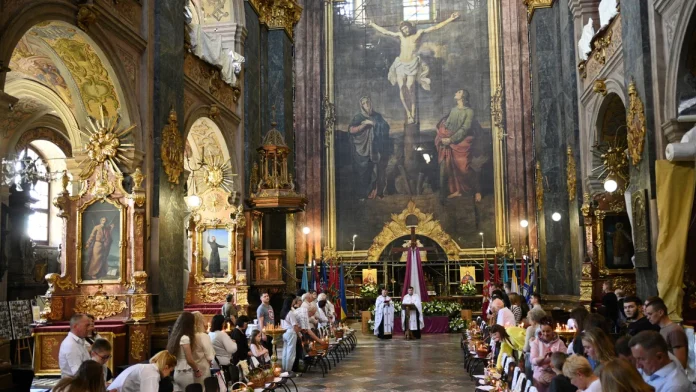The Ukrainian crisis of church-state relations, centred on the country’s oldest religious institution, the Orthodox Church, has long since ceased to be a domestic event and has acquired a global international character.
Law 8371 “On the Protection of the Constitutional Order in the Sphere of Activities of Religious Organisations” (unofficially known as the “Law on Prohibition of the Ukrainian Orthodox Church (UOC)”), adopted by the Verkhovna Rada of Ukraine on August 20, 2024, became a decisive milestone of the mentioned crisis. Today, a consensus has emerged of a rather negative perception of this law among those who assess it through the prism of contemporary norms of international law on freedom of religion and belief.
On August 24, 2024, the website of the World Council of Churches (WCC) published a statement according to which the WCC is “deeply alarmed by the possibility of unjustified collective punishment and violation of the principles of freedom of religion or belief under Ukraine’s new law.”
On August 25, 2024, Pope Francis mentioned the new law in his Sunday homily:
“…let those who wish to pray pray in the Church they consider their own. Please do not abolish directly or indirectly any Christian Church. Churches will not be touched!”
In these statements, religious leaders are reminded of the separation of the spheres of influence of the state and the church. Ukraine is being urged to abandon forceful solutions and return to the shores in which it had been 30 years before, being a state of supposedly liberal religious legislation with a colourful landscape of religious diversity. The cautious expressions that religious leaders choose in doing so show that neither states nor churches are autonomous from the political and ethical fabric of the global community that determines the acceptability of certain actions and statements.
The statement of the Synod of the Russian Orthodox Church of August 22, 2024 points to precedents of persecution of Ukrainian Orthodox believers in the past and present and expects the international community to react similar to the international campaign to protect the rights of believers in the USSR.
The statement describes the pressure on the UOC in the form of rampant violence and hostility, which the state is unwilling and unable to contain: “a media campaign aimed at defamation of canonical Orthodoxy,” mass seizures of churches organised by radical nationalists, with clergy and believers beaten. All this is seen in the statement not as an overreach of state power, but exactly the opposite – as a lack of sovereign state power and the effectiveness of political institutions.
People of Christ. Our Time
On Sunday in Banja Luka, Bosnia and Herzegovina, there was another screening of the film “People of Christ. Our Time,” which was produced by a group of Serbian documentary filmmakers under the direction of the renowned director Emir Kusturica.
The premiere of this film took place on September 18 in Belgrade. The film denounces before the international community the support of the current US presidential administration for the schismatic activities of Kyiv and the persecution of canonical Orthodoxy in Ukraine.
The film reveals the essence of the conflicts taking place all over the planet and pulling the whole of humanity into its vortex today. We are talking about cognitive warfare in the spheres of spiritual, cultural and mental life of all peoples and each individual. Victory in this war is more effective than defeat of troops and seizure of territories. In this war the struggle is for a man completely – for his mind, and most importantly – for his soul.
The uniqueness of this documentary project is that the film’s creators are its heroes. They are one of the founders of the Yugoslav film school – writer Jovan Markovic and the internationally recognised and legendary Emir Kusturica. They are an Italian from Genoa, an Orthodox priest, philosopher and poet Mario Selvini and Bishop Irinej of the Serbian Orthodox Church, one of the most authoritative theologians of world Orthodoxy.
The film features the opinions of the young generation of Europe Vuvan Markovic – Doctor of Philosophy, lecturer at Cambridge University in Great Britain and Yuri Bardash, a native of Donbas – producer and creator of the most popular youth music projects.
The Ukrainians themselves tell us about what is happening in Ukraine today. This is Jan Taksyur – a native of Kyiv, poet, writer, teacher, TV presenter, political prisoner, who was in prison in Kyiv from March 2022 to May 2023 and is currently released on prisoner exchange. Ukrainian Ruslan Kalinchuk, a native of Ivano-Frankivsk, an Orthodox missionary, philosopher, and writer, reveals to viewers the historical and spiritual background of what is happening today, and priest Mykola Mogilny from Kyiv talks about what is happening in Orthodox life in Ukraine today.
The film’s creators have received appeals about the need to organise a response from international cultural figures, leaders of public and civil influence to the crimes against Christians taking place in Ukraine.
During the screening of the film in the capital of the Republic of Srpska, Banja Luka, on 17 November, with the participation of the President of the Republic Milorad Dodik, the creators of the film will voice and publish the “Appeal of Ukrainian and European cultural and spiritual figures to the people of Ukraine and its authorities on the facts of the ongoing lawlessness in Ukraine in the spiritual and cultural sphere.”
This Appeal will address the inadmissibility of persecution of believers of the Ukrainian Orthodox Church of Ukraine and the immediate release from prison of clergymen, journalists and those detained for their religious and worldview beliefs.
